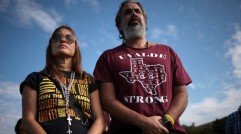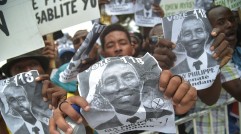Syria Misses Chemical Weapon Deadline: Amid Civil War Conflict, Al-Assad Government Breaks Deal Brokered by US and Russia
Amidst the violence of a civil war, Syria's embattled government is trying to comply with an international agreement to destroy its chemical weapons arsenal. The nation's vast amount of chemical weapons came under scrutiny last year following a chemical attack on civilians.
In August last year, an attack was recorded in which various civilians in a suburb of Damascus suffered from what was deemed symptoms from chemical weapons. Both sides of the conflict blamed the other, and the international community stepped in to investigate. According to the New York Times, in the subsequent deal brokered by the United States, which sides with the rebels, and Russia, which supports the government, all of Syria's weapons were to be destroyed by June.
However, the government of President Bashar al-Assad missed the second self-imposed deadline to finalize the process. The Times reports that the Sunday deadline passed with only 92.5 percent of the arsenal destroyed, according to Sigrid Kaag, the coordinator of the joint mission by the United Nations and the watchdog agency, the Organization for the Prohibition of Chemical Weapons (OPCW).
However, Kaag remains optimistic. Despite a slow start in the first two months of the year, which led to missing the February deadline, the disposal picked up in March and April.
"The 30 June deadline is around the corner," Ms. Kaag was quoted by news agencies as saying, "and we are hopeful that this is possible and will be met."
The complex disposal procedure has also hindered the process. According to the Times, the most dangerous chemicals are transported unto the American ship Cape Ray and are destroyed at sea or in facilities in Europe or the United States. The remaining 7 to 8 percent, according to Michael Luhan, a spokesman for the agency, said could be removed in "one large consignment or two regular consignments."
Yet, Syria's problem with chemical weapons is not over. According to the Chinese news agency Xinhua, OPCW has called for a joint investigation into an attack that used chlorine gas. Both sides of the conflict blame each other for the attack, which happened in the rebel-held area of Kafr Zaita.
Subscribe to Latin Post!
Sign up for our free newsletter for the Latest coverage!














